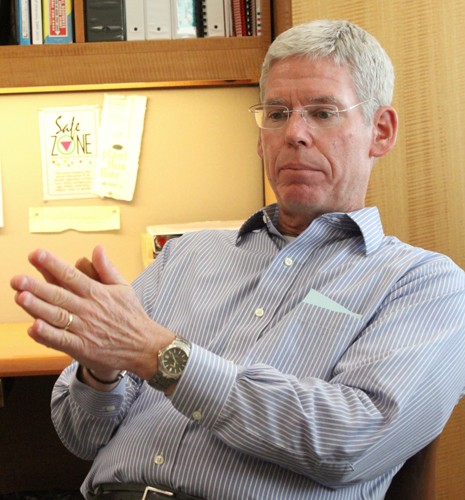Fewer students were evicted from the residence halls in fall 2009 than the previous two years.
In fall 2009, 27 students were evicted, two students fewer than during fall 2008, according to Sarah Casares, coordinator of student behavioral education for Residence Life.
The most common reasons for eviction in fall 2009 were drug use, alcohol violations and endangerment.
Of the 27 evicted in fall 2009, nine students did not have previous incidents, warnings or write-ups before the eviction, and 18 students had been involved in previous incidents.
“”With the 18 students who had prior violations, it shows they didn’t learn from their mistakes,”” said Jim Van Arsdel, assistant vice president of Residence Life and sole media relations representative.
Van Arsdel is one of the few Residence Life officials with the authority to speak to the media, so community directors and residence assistants were unable to comment. Residence Life employees work to help students stay in the dorms according to Van Arsdel.
“”We don’t want to be the people who say, ‘This person gets to stay, and this person has to go,'”” Van Arsdel said. “”We really try hard to keep students in the halls. We try to provide an environment in which students can go out and make mistakes as long as they’re not really, really big ones.””
Last semester, there were thousands of students who had broken policy violations, Van Arsdel said.
“”If we look at 27 evictions (of fall 2009 semester) as a percentage of the total number of policy violations, it’s actually a very, very small number,”” Van Arsdel said. “”And that’s as it should be. We shouldn’t have some huge number.””
Of the 22 residence halls on campus, Casares could not specify which halls the residents had been living in at the time of their eviction.
“”Our system removes their residence hall address after they check out,”” Casares said.
The eviction count in fall 2006 was 44, and in fall 2007, there were 14 evictions.
“”Residence life takes an educational approach to student behavior and conduct, and when student actions are not in line with community standards, we follow set sanctions to address that behavior,”” Casares said.
Students are informed of policies and procedures when they check into halls and are expected to know and follow such policies when they live in the system, Casares said.
“”In our world, kicking out someone is the most extreme thing that we can do,”” Van Arsdel said. “”It’s also something that if we do it, we lose all future opportunity to have an impact on that student, and everyone in Residence Life is in it to have an impact. Losing that opportunity is seen as cause for grief.””
Evictions take place on a case-by-case basis, Van Arsdel said. Staff and students determine when reading the incident reports whether a student truly is responsible for something or not.
“”If and only if they are found responsible, we come up with what an appropriate sanction should be,”” Van Arsdel said.
Appropriateness can have a lot of definitions, he added.
“”In my mind, appropriateness usually has to do with the number of prior violations that might have occurred, the kinds of violations that might have occurred, the kind of violation that this is,”” Van Arsdel said.
Residence Life’s goal is to stop behavior that’s inconsistent with policies, Van Arsdel said.
“”Something as simple as someone being a little too loud, well, life goes on,”” Van Arsdel said. “”I worry more about alcohol, which is the number one problem most schools have. I worry a whole lot more about assault, weapons, other drugs and safety violations.””
Family and consumer sciences sophomore Angela Palomer has a mixed view on residence hall evictions.
“”It really depends on the situation,”” Palomer said. “”I’ve known students who were kicked out of the dorms for drug use, and that makes sense because they would get in trouble for that in the real world. If it’s something the real world wouldn’t accept, then dorm residents should suffer the consequences accordingly.””
Residents are given a physical copy of the Community Living Guide when they move into the residence halls. The guide lays out the ways in which a resident can be evicted.
Incidents that can result in an automatic eviction include, but are not limited to: bomb threats, possession of large amounts of alcohol beyond single-serving size whether you are underage or over 21, repeated use or possession of alcohol, possession of a weapon and theft.
“”The university may terminate your Housing License Agreement if you do not abide by the Community Standards or University rules,”” according to the 2009-10 Community Living Guide.
Residence Life employees want to treat students as adults.
“”We have to realize that students are young. Some of them want to be treated as adults; some still want to be treated as kids. This places the staff in a position where we have to manage that environment through the behavioral standards that we have,”” Van Arsdel said.
Van Arsdel said that consequences of what might have occurred or what has occurred hold the most weight in the determining who gets evictions or write-ups.
“”If I go out drinking, there’s a certain consequence to me, but if I walk down the hall and throw up all over the hall, there’s probably a consequence to everyone around me, but that happens certainly every week (in residence halls),”” Van Arsdel said.
Van Arsdel said that eviction is a last resort measure that Residence Life will take.
“”I hope it’s evident that the staff who do this are in this for the desire to help students, not because they love kicking out people,”” Van Arsdel said. “”That’s never a fun thing to do, even when you’re absolutely convinced that this is not the right place or time for that person.””









